

Data Security & Privacy. Doctor fined, censured for spying at patients' records. Health workers urged to focus on meaningful use of patients' data. Singapore’s Doctors as Big Brother: Electronic Health Records. George Orwell's 1984 is a distant memory for most of us.

Human emotion is not yet illegal but in many respects the Information Age is closer to Orwell's vision than we may wish to admit. The ubiquitous closed circuit television (CCTV) camera is a part of modern life. Most modern gadgets, including the cell phone, computer and each swipe of a credit card leave a unique electronic signature which can be used to piece together our life. The news is not all bad. Take the case of health care records. Singapore's Central Health Records against Hippocratic Oath - SgForums.com. Health Care's Digital Privacy Debate - Forbes.com. Electronic Patient Record Keeping - Limitations Due to Privacy and Security Issues. When it comes to electronic health and medical records (EMRs), the digital technology has a few limitations.
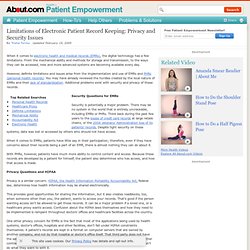
From the mechanical ability and methods for storage and transmission, to the ways they can be accessed, new and more advanced systems are becoming available every day. However, definite limitations and issues arise from the implementation and use of EMRs and PHRs (personal health records). You may have already reviewed the hurdles created by the local nature of EMRs and their lack of standardization. Additional problems exist with security and privacy of these records. Security Questions for EMRs Security is potentially a major problem.
Electronic health records: Concerns about potential privacy breaches remain an issue. Although physicians support the use of electronic health records, concerns about potential privacy breaches remain an issue, according to two research articles published in the January 2010 issue of the Journal of the American Informatics Association (JAMIA), in its premiere issue as one of 30 specialty titles published by the BMJ (British Medical Journal) Group, UK.
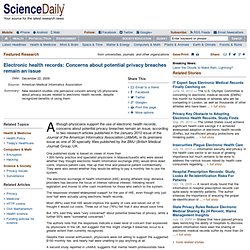
One published study is based on views of more than 1,000 family practice and specialist physicians in Massachusetts who were asked whether they thought electronic health information exchange (HIE) would drive down costs, improve patient care, free up their time and preserve patient confidentiality. They were also asked whether they would be willing to pay a monthly fee to use the system. Electronic Health Records: Privacy Issues Remain.
Beginning with the February economic stimulus package, the Obama administration has made it clear that the digitization of medical records is a high priority.

But converting people's most sensitive personal information into the digital format inevitably brings privacy concerns in tow, and a new study has called attention to just how significant the challenge may be. In a national poll of more than 500 IT personnel at large health-care organizations, the Ponemon Institute research group found that 80 percent had experienced a data breach that compromised patient records in the past year. Four percent reported more than five breaches. "The majority of IT practitioners in our study don’t believe that their organizations have adequate resources to protect patients’ sensitive or confidential information," Larry Ponemon, the group's chairman and founder, said in a statement. Consumers Still Wary of Electronic Health Records - Healthcare - Electronic Medical Records.
Patients have strong concerns about privacy, security, complexity related to ditching paper for digital health records, Xerox survey shows.
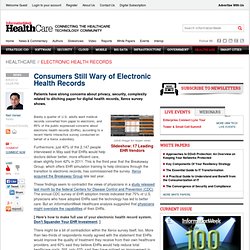
Patients Want Electronic Link To Doctor's Notes - Healthcare - The Patient. Physicians are less convinced that sharing the information would improve patient care. 9 Mobile Health Apps Worth A Closer Look (click image for larger view and for slideshow) While the federal government's EHR incentive program requires physicians to provide visit notes to patients who request them, little is known about how doctors and patients view this kind of information sharing or what effect it has on patient care.
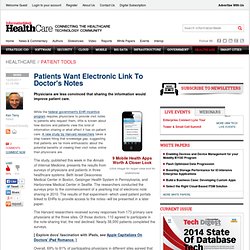
A new study by Harvard researchers takes a step toward filling that knowledge gap, suggesting that patients are far more enthusiastic about the potential benefits of viewing their visit notes online than physicians are. The study, published this week in the Annals of Internal Medicine, presents the results from surveys of physicians and patients in three healthcare systems: Beth Israel Deaconess Medical Center in Boston, Geisinger Health System in Pennsylvania, and Harborview Medical Center in Seattle. In an accompanying editorial, Thomas W.
The M.D. Aspects of privacy for electronic health re... [Int J Med Inform. 2011. Electronic audits can prevent, catch data breaches. By Pamela Lewis Dolan — covered health information technology issues and social media topics affecting physicians.
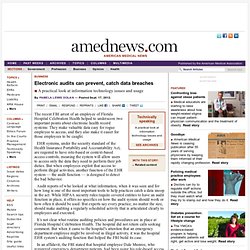
Connect with the columnist: @Plewisdolan — Posted Sept. 17, 2012. The recent FBI arrest of an employee of Florida Hospital Celebration Health helped to underscore two important points about electronic health record systems: They make valuable data easy for rogue employee to access, and they also make it easier for those employees to be caught. EHR systems, under the security standard of the Health Insurance Portability and Accountability Act, are required to have role-based or context-based access controls, meaning the system will allow users to access only the data they need to perform their job duties. But when employees exploit that access to perform illegal activities, another function of the EHR system — the audit function — is designed to detect the bad behavior. The hospital fired Munroe in July 2011. When to audit Copyright © 2012 American Medical Association. Two Factor Authentication. I've previously written about innovative approaches to strong identity management which we're investigating.
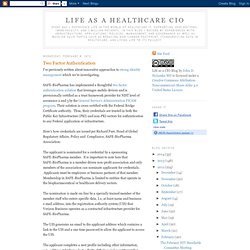
SAFE-BioPharma has implemented a thoughtful two factor authentication solution that leverages mobile devices and is provisionally certified as a trust framework provider for NIST level of assurance 2 and 3 by the General Service's Administration FICAM program. Their solution is cross certified with the Federal Bridge Certificate authority. Thus, their credentials are trusted in both the Public Key Infrastructure (PKI) and non-PKI sectors for authentication to any Federal application or infrastructure. Here's how credentials are issued per Richard Furr, Head of Global Regulatory Affairs, Policy and Compliance, SAFE-BioPharma Association: The applicant is nominated for a credential by a sponsoring SAFE-BioPharma member.
The UIS generates an email to the applicant address which contains a link to the UIS and a one time password to allow the applicant to access the UIS. 1.